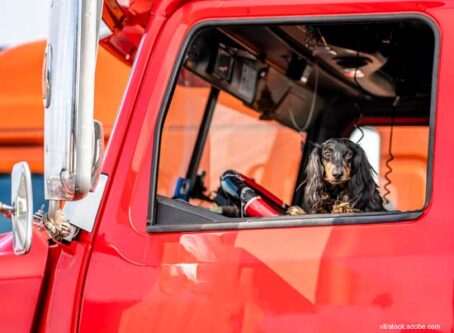How hard can it be to own a trucking business?
Ever notice that folks who have a whole lot of education and book-learning have the idea that trucking can’t possibly be that hard?
I’ve written for and been submerged in the industry for more than a decade now, and I can’t tell you the number of times I’ve read the riot act to someone (overeducated or not) who said, “How hard can it be? You drive things from one place to another and collect tons of money. What’s hard about that?”
Au contraire, mon frere. (That’s French for, “You a damn fool, friend.” Or something like that.)
This became abundantly apparent to former CEO of Starsky Robotics, Stefan Seltz-Axmacher. When we spoke to him last June, Seltz-Axmacher revealed the developing autonomous truck company was running a human-operated fleet alongside their autonomous endeavors – but it wasn’t as easy as he thought it would be.
Starsky has since ceased to operate. At the pinnacle of their 15-minutes of fame, the autonomous company had 34 human-operated power units. Their intention was to learn as much as they could about the nondriving parts of operating a trucking company, thus allowing them to use both platforms of information to improve their product.
Smart cookies. That actually makes sense.
There were hopes of the human-powered fleet helping fund the whole incredibly expensive kit and caboodle with enormous profits while the robots learned about easy-peasy trucking.
Unfortunately, complexities of the trucking industry and robots don’t seem to mesh well. (See also: ELD.)
In turn, the vast differences in freight and conditions under which it is moved makes it difficult for a robot-brain truck company to survive.
When Starsky folded in March, Seltz-Axmacher published a lengthy essay on why the business didn’t succeed. He didn’t mention much about the human-powered fleet, but he did seem to take away at least one of the reasons the trucking industry is so difficult to master.
“Everybody talks about how safety is No. 1, but it really isn’t and doesn’t attract the attention of investors.”
(Substitute FMCSA for “investors” and you still have an incredibly true statement.)
Well, whaddya know? Give that man a cee-gar. And maybe some education on how to run a trucking business with Homo sapiens at the helm before he tries to open another Borg-transport.
But wait – the education should probably be more than the 600-word space filler I read this morning.
Took me longer to eat an Eggo waffle than it did to read it. And I loves me some Eggo waffles, y’all.
“Everything you need to start a trucking company,” caught my eye as I was industriously filling each and every little square of aforementioned waffle. Mostly because there’s a picture of a European truck with the caption, “America’s trucking industry has been called the “lifeblood of our economy” and it serves as the backbone for thousands of supply chains.”
I hate it when that happens. But I was trying to be nice (and wait for the butter to melt), so I read the piece anyway. I was done before it happened. (I don’t eat syrup, so I use a lot of butter on my waffles, OK? It takes a minute to melt. Jeez.)
In all fairness, the piece did include all the important highlights. Get truck, get appropriate licensure and certifications (and insurance). In short, pay, pay, pay. But there’s no mention of paying an experienced, professional driver, or what it would cost to adequately train and prepare someone to do that job.
Good info. Very nice. Also an incredibly brief overview of what it takes to make it in the business. And why in the blue hell would you go into debt if you weren’t planning to make it?
Heavens to Betsy. Let me sum it up for you.
Truckin’ ain’t easy, baby. The End.
So if you’re interested in an education that really delves into the subject and takes a click longer than melting butter on an Eggo, for the love of everything roadworthy, take OOIDA’s Truck to Success course.
Yes, this is a shameless plug, and it’s shameless because there’s not a course out there that will better prepare you for success in the business. You know why? They don’t necessarily measure success just on the successful businesses that grow from it. They also measure their success by the number of people who take the class and decide it’s either not for them or they’re not financially ready for the leap.
That’s how you know it’s a good education.
If you’re looking to bathe yourself in the waters of independent trucking, take the Truck to Success course. It’s well worth a small investment in education to decide whether or not you’re ready for a big one.









